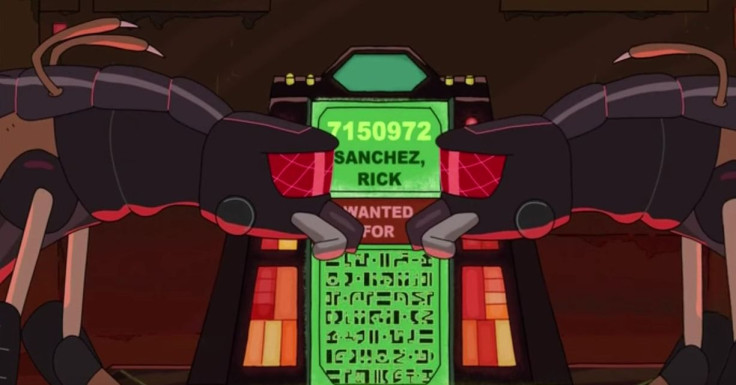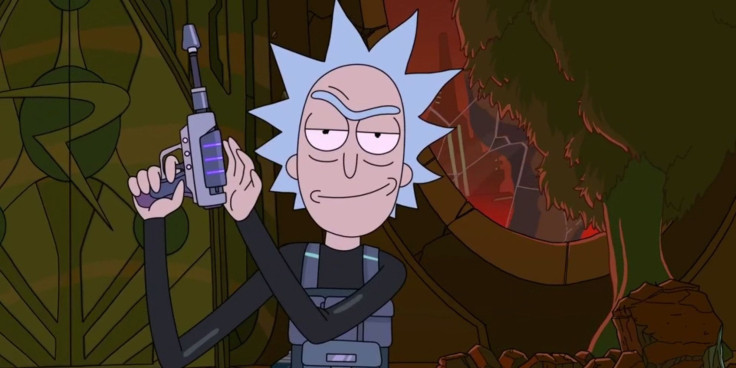There’s a post on the Rick and Morty subreddit titled “ Let’s go exploring.” It imagines Morty Smith as Calvin and his grandfather Rick Sanchez as Hobbes, out on one of their wilderness adventures. People tweet about their crush on Rick, idolize Rick, even describe how they became a STEM student to follow in his footsteps. They admire and identify with Rick. But should he be admired? Or are we being taken in by a charming psychopath? The Rick and Morty Season 3 premiere reveals a side of him that should call into question our sentimentalizing treatment of Rick.
Rick never pretends to be anyone but the smartest man in the room, often berating or manipulating the people closest to him. He’s an asshole, but it’s hard not to be on his side when he turns his withering gaze on galactic federation bureaucracies, con artist aliens, or the literal devil. Occasionally we see a flash of sentiment, suggesting that despite his cynical exterior, Rick genuinely cares about Morty, Summer and Beth (he’s never had anything but contempt for son-in-law Jerry). In the Season 2 premiere of Rick and Morty, one out of 64 Ricks sacrifices his life for Morty’s, muttering “be good Morty, be better than me.” At the end of Season 2, Rick turns himself in, seemingly to spare his family from retribution by the Galactic Federation.
But we have been deceived.
In the first episode of Season 3, “The Rickshank Redemption” — after escaping prison, destroying the galactic economy and killing thousands of rival Ricks from parallel dimensions — Rick explains to Morty just how valueless he views any priorities but his own. It’s worth quoting in full:
“We’ve got adventures to go on, just you and me. And sometimes your sister and sometimes your mom, but never your dad, do you want to know why, Morty? Because he crossed me… oh, it gets darker, Morty. Welcome to the darkest year of our adventures. First thing that’s different, no more dad, Morty. He threatened to turn me into the government, so I made him and the government go away. I replaced them both as the de facto patriarch of your family and your universe. Your mom wouldn’t have accepted me if I came home without you or your sister, so now you know the real reason I rescued you. I just took over the family, Morty, and if you tell your mom or your sister any of this I’ll just deny it and they’ll take my side because I’m a hero, Morty. And now you’ve got to do whatever I say, Morty, forever.”
“Oh fuck,” Morty moans, the only person still alive (other than us) who has any inkling of just how far Rick will go to fulfill his own ends (Szechuan Sauce).
Though it’s a bit diagnostically fuzzy — the DSM prefers antisocial personality disorder and dissocial personality disorder — the label of “sociopath” has been a popular one lately. A sociopath is generally considered anyone who acts with pure, disinhibited ego, apparently oblivious or callous to others to the point where we suspect they have no conception of empathy at all. It’s similar or identical to a psychopath, though we usually reserve sociopath for someone passing as a societally functional individual. Setting aside any actual basis in psychology, sociopathy has become a red line of sorts, separating the merely competitive or emotionally manipulative from those whose behavior places them outside the bounds of acceptable human behavior. You may have heard people describe coworkers, acquaintances or politicians as sociopaths. And if people in our everyday lives cross that line, Rick deserves the same censure to our estimation of him.
So as not to smear Rick unfairly, let’s measure him against the Hare Psychopathy Checklist (central to Jon Ronson’s estimation of potentially sociopathic CEOs in his book, The Psychopath Test), which lists 20 indicators of psychopathy. Each item can be scored from 0 (doesn’t apply) to 2 (a good match). Score above a 30, you’re a psychopath (serial killer Ted Bundy scored a 39).
As Rick would say, “And awaaay we go!”
Hypothesis: Rick will definitely score high enough to be considered a psychopath, but wouldn’t most cartoon characters? Homer Simpsons seems vulnerable to the Hare checklist. So does Jonas Venture, Sterling Archer, Eric Cartman, Beavis and Woody Woodpecker.
“glib and superficial charm”
Is this glib enough for you?
Rick uses sentiment to get what he wants from his daughter, Beth, but it’s hard to disentangle manipulation from genuine feeling. Rick rarely chooses to be charming, he has no need for unctuousness, but when he chooses to, such as in his wedding speech for his best friend Birdperson, Rick’s charm is anything other than superficial.
1 out of 2
“grandiose (exaggeratedly high) estimation of self”
Rick thinks he’s the smartest being, maybe in the entire universe. The problem is, he might be right ( Rick and Morty validates this reading at every turn). But there are indicators that Rick might even hold higher estimations of himself, such as his description of himself as “the smartest thing in every conceivable universe. The Infinite Rick. A god.” But is this his actual self-assessment, or just part of his efforts to trick a Galactic Federation interrogator? Either way, it’s hard to imagine scoring him a zero on this item.
1 out of 2
“need for stimulation”
2 out of 2
“pathological lying”
Rick lies often, but pathologically? He’s never compulsive. Rick’s lies always seems motivated toward a specific outcome.
0 out of 2
“Cunning and manipulativeness”
2 out 2
“lack of remorse or guilt”
Well, here’s what Rick says after he destroys Earth, transforming everyone into Cronenbergs with a love potion he accidentally weaponized:
“It’s fine, everything’s fine. There’s an infinite number of realities Morty… we can just slip into the place of our dead selves in this reality and everything will be fine. We’re not skipping a beat, Morty.”
“What about the reality we left behind?” Morty asks.
“What about the reality where Hitler cured cancer, Morty? The answer is: don’t think about it.”
Maybe Rick stacking his mistakes against an immense, universal relativism is the only possible response without cracking the human mind, but whatever his rationale, remorse and guilt don’t seem to enter Rick’s moral calculus.
2 out of 2
“shallow affect (superficial emotional responsiveness)”
Rick may close himself off to emotion, which limits his responsiveness, but his rare sentimentality never feels shallow. His suicide attempt in Season 2 seems directly motivated by guilt over the emotional turmoil he causes in others.
0 out of 2
“callousness and lack of empathy”
Remember Rick’s reaction to this in Season 1 episode “Close Rick-counters of the Rick Kind”?
“I fiddled with a concept like this once. On paper, Morty! On paper! I wouldn’t do this, it’s barbaric overkill. I mean, you can accomplish the same result with like five Mortys and a jumper cable.”
2 out of 2
“parasitic lifestyle”
Rick puts his grandson in constant danger to keep “Morty waves” in close enough proximity to protect him from surveillance. Like a cuckoo, Rick intentionally displaced Jerry to secure his spot in the house. Oh, and he enslaved a pocket universe to charge his cell phone and power his spaceship.
2 out of 2
“poor behavior controls”
Excepting his alcoholism, Rick keeps tight control over every aspect of his behavior. He may have poor behavior, but it’s undoubtedly under his control.
0 out of 2
“sexual promiscuity”
2 out of 2
“early behavior problems”
We don’t know.
0 out of 2
“Lack of realistic long-term goals”
“I’ll go out and I’ll find some more of that Mulan szechuan teriyaki dipping sauce, Morty. Because that’s what this is all about, Morty. That’s my One-Armed Man. I’m not driven by avenging my dead family, Morty. That was fake. I’m driven by finding that McNugget sauce. I want that Mulan McNugget sauce, Morty. That’s my series arc, Morty. If it takes nine seasons. I want my McNugget dipping sauce, szechuan sauce, Morty. That’s what’s going to take us all the way to the end, Morty. Nine more seasons, Morty. Nine more seasons until I get that dipping szechuan sauce.”
Realistic enough?
0 out of 2
“impulsivity”
An impulsive person would do this...
But would an impulsive person build multiple back-ups of himself? Sure, he smashes Project Phoenix, but Rick is always thinking of the consequences of his actions, which isn’t very impulsive.
0 out of 2
“Irresponsibility”
There’s too much to list here, but the Cronenberg-ing of his original Earth should be enough. Hunger Games Summer is his fault.
2 out of 2
“failure to accept responsibility for his own actions”
Again:
But in other ways, Rick takes too much responsibility, freely altering galactic economies and occasionally saving Earth from a godlike race of reality TV watchers. What does responsibility mean on that scale?
1 out of 2
“many short-term marital relationships”
We don’t know much about Rick’s past. His romantic relationship with Unity, a parasitizing hive-mind like the pod people of Invasion of the Body Snatchers , seemed a little self-destructive, but within the bounds of relational normality, oddly enough.
0 out of 2
“juvenile delinquency”
We don’t know.
0 out of 2
“revocation of conditional release”
Not applicable.
0 out of 2
“criminal versatility”

After turning himself into Galactic Federation prison at the end of Season 2, another maximum security detainee asked him, “what are you in for?”
“Everything.” Rick is criminally versatile and proud of it.
2 out of 2
Rick scores a 19 on the Hare Psychopathy Test. Even if he scores a two in every category for which we have incomplete information, he’d still only get a 25, which would barely make him a psychopath in Great Britain (seems like a weird test to have different national standards on, but here we are).
After Rick’s rant at the end of “The Rickshank Redemption” I thought finding evidence of Rick’s sociopathy would be easier. If Rick isn’t a psychopath, what TV character is? But while conducting the survey, the question began to be feel irrelevant and silly. Because TV characters are composites of many writers, they may never cohere into a diagnosable personality. And Rick’s psychopathy is obviously complicated by the scale of his moral canvas — most people’s actions don’t reverberate through millions or billions of other lives like Rick’s do. At that scale you don’t need to be a psychopath to be a galaxy-spanning calamity or a single family’s worst nightmare. So before romanticizing him, heed Morty’s advice: “He’s not a villain, Summer, but he shouldn’t be your hero.”








![Best Gaming Mouse For Gamers With Smaller Hands [2025]](https://d.player.one/en/full/227430/best-gaming-mouse-gamers-smaller-hands-2025.png?w=380&h=275&f=fdcf47c1c5fc58d1e41d3be505c12568)










